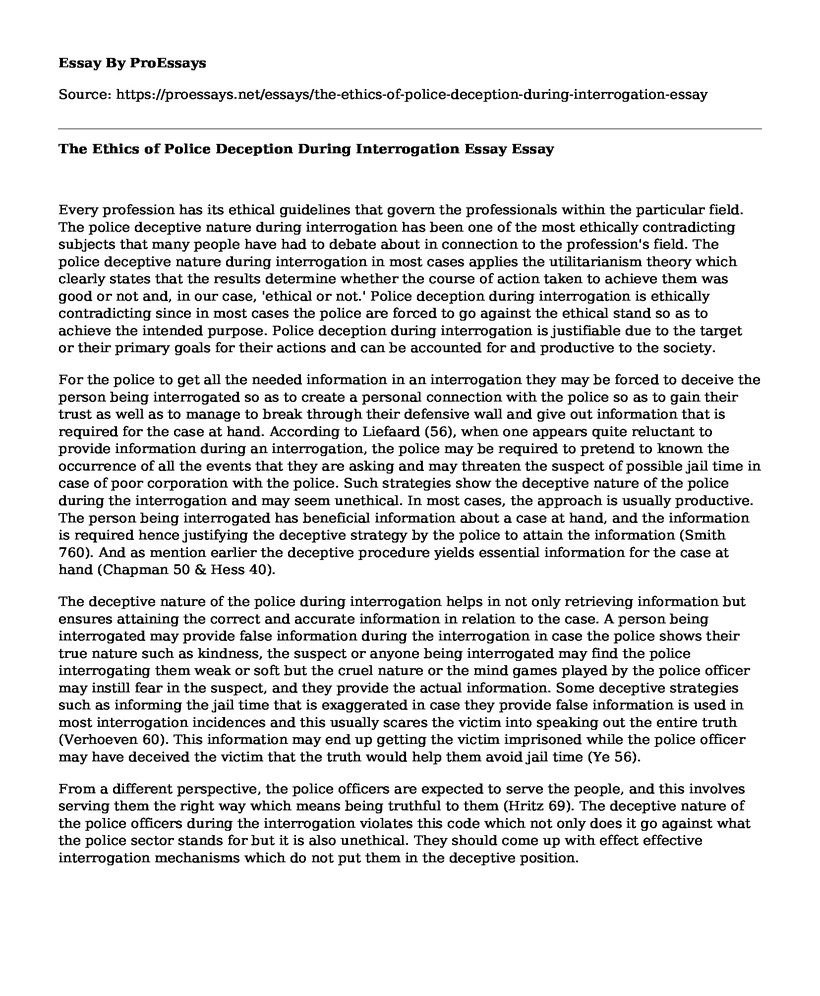Every profession has its ethical guidelines that govern the professionals within the particular field. The police deceptive nature during interrogation has been one of the most ethically contradicting subjects that many people have had to debate about in connection to the profession's field. The police deceptive nature during interrogation in most cases applies the utilitarianism theory which clearly states that the results determine whether the course of action taken to achieve them was good or not and, in our case, 'ethical or not.' Police deception during interrogation is ethically contradicting since in most cases the police are forced to go against the ethical stand so as to achieve the intended purpose. Police deception during interrogation is justifiable due to the target or their primary goals for their actions and can be accounted for and productive to the society.
For the police to get all the needed information in an interrogation they may be forced to deceive the person being interrogated so as to create a personal connection with the police so as to gain their trust as well as to manage to break through their defensive wall and give out information that is required for the case at hand. According to Liefaard (56), when one appears quite reluctant to provide information during an interrogation, the police may be required to pretend to known the occurrence of all the events that they are asking and may threaten the suspect of possible jail time in case of poor corporation with the police. Such strategies show the deceptive nature of the police during the interrogation and may seem unethical. In most cases, the approach is usually productive. The person being interrogated has beneficial information about a case at hand, and the information is required hence justifying the deceptive strategy by the police to attain the information (Smith 760). And as mention earlier the deceptive procedure yields essential information for the case at hand (Chapman 50 & Hess 40).
The deceptive nature of the police during interrogation helps in not only retrieving information but ensures attaining the correct and accurate information in relation to the case. A person being interrogated may provide false information during the interrogation in case the police shows their true nature such as kindness, the suspect or anyone being interrogated may find the police interrogating them weak or soft but the cruel nature or the mind games played by the police officer may instill fear in the suspect, and they provide the actual information. Some deceptive strategies such as informing the jail time that is exaggerated in case they provide false information is used in most interrogation incidences and this usually scares the victim into speaking out the entire truth (Verhoeven 60). This information may end up getting the victim imprisoned while the police officer may have deceived the victim that the truth would help them avoid jail time (Ye 56).
From a different perspective, the police officers are expected to serve the people, and this involves serving them the right way which means being truthful to them (Hritz 69). The deceptive nature of the police officers during the interrogation violates this code which not only does it go against what the police sector stands for but it is also unethical. They should come up with effect effective interrogation mechanisms which do not put them in the deceptive position.
Conclusion
Although the police deception during an interrogation is fundamental since it allows the officers gather adequate information which when observed on a broader spectrum, it also seems entirely ethical when defined in the manner of helping the police officers serve the people better. The deception helps the police officers attain the accurate information which in return helps them make justifiable actions based on the gathered information.
Cite this page
The Ethics of Police Deception During Interrogation Essay. (2022, May 17). Retrieved from https://proessays.net/essays/the-ethics-of-police-deception-during-interrogation-essay
If you are the original author of this essay and no longer wish to have it published on the ProEssays website, please click below to request its removal:
- Job Requirements Analysis for Police Officer - HR Case Study Example
- Essay Sample on Transport Usage in Australia
- Occupational Safety, Health, and Environment of Firefighters Essay
- Nursing and Matters of Spirituality and Meaning of Life Paper Example
- Policing Programs in the Rio Grande Valley Essay Example
- Principles on Fleet Management Paper Example
- Paper Example on People's Identity Construction on Social Media Platforms







